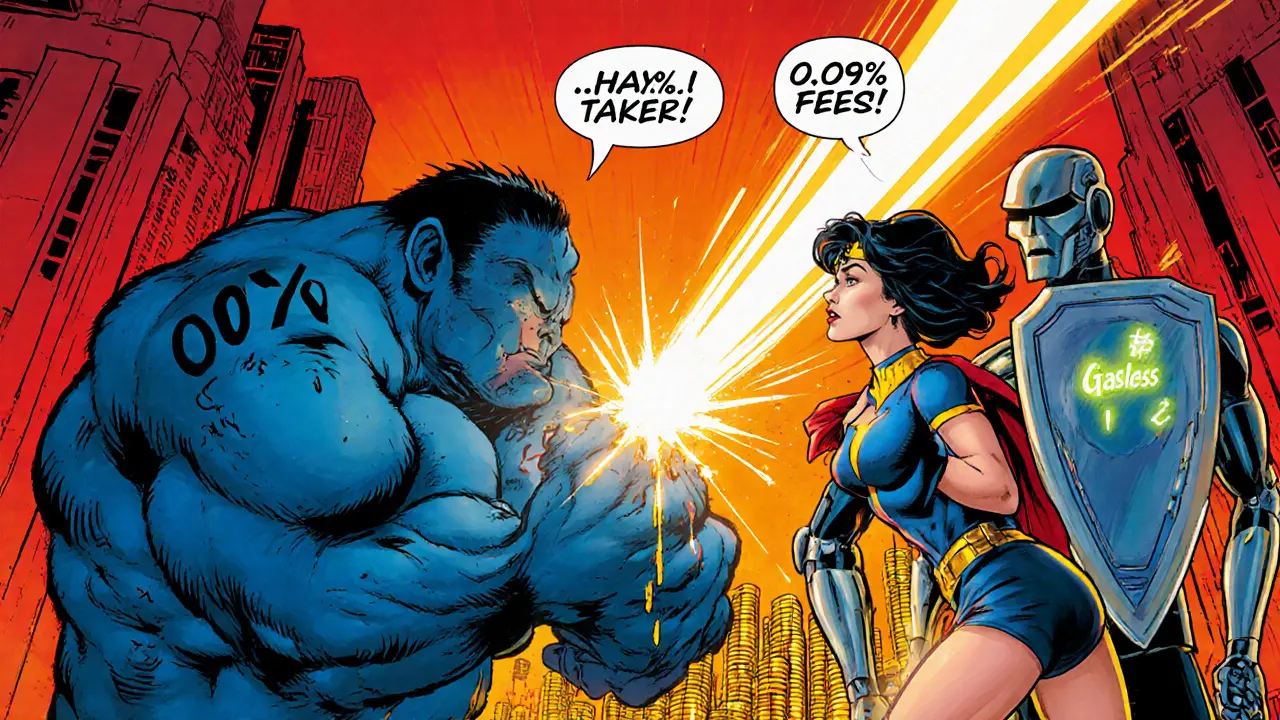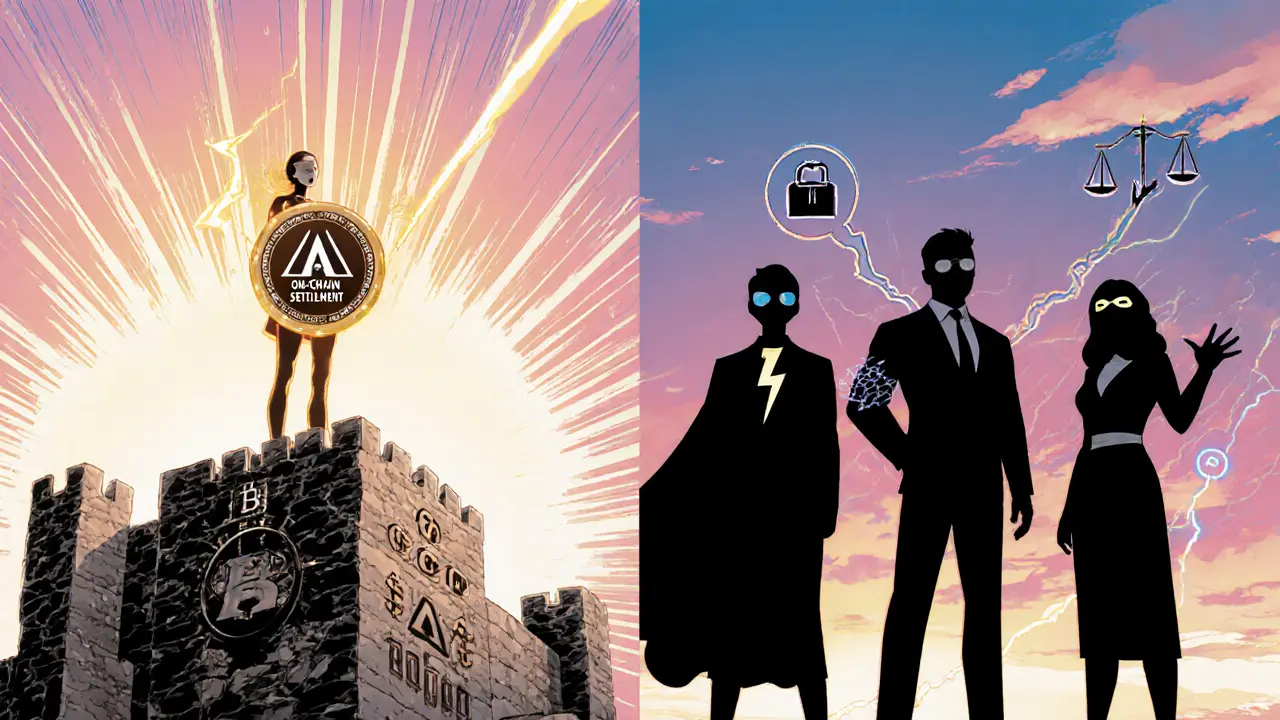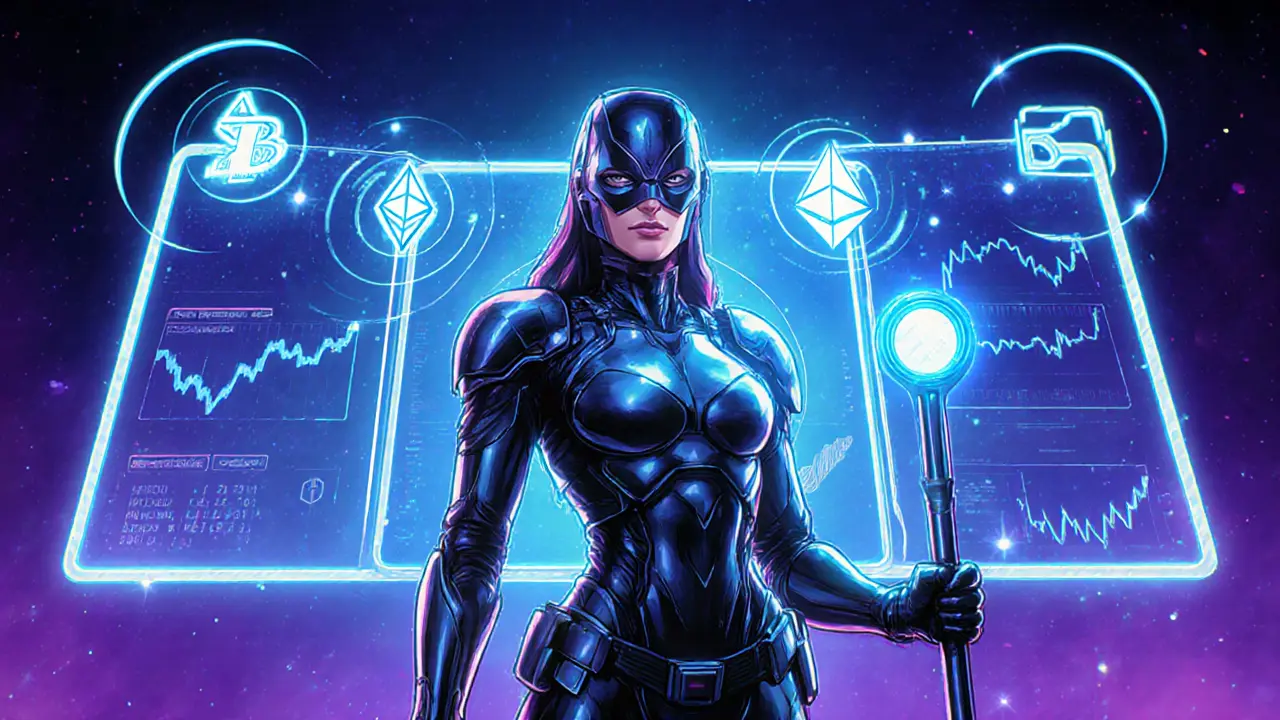ADEN Exchange Fee Calculator
Fee Analysis for ADEN Exchange
ADEN offers one of the lowest fee structures in DeFi with 0% maker fees and 0.0009% taker fees. Use this calculator to estimate your trading costs based on trade size and frequency.
Enter values and click "Calculate Estimated Monthly Fees"
Fee Comparison Table
| Exchange | Maker Fee | Taker Fee | Gas Model |
|---|---|---|---|
| ADEN | 0% | 0.0009% | Gasless (Orderly Network) |
| Kraken Pro | 0% (high-volume) - 0.02% (standard) | 0% - 0.26% depending on volume | Standard on-chain fees |
| Coinbase | 0% - 0.5% | 0% - 0.5% | Standard on-chain fees |
| Uniswap V3 | 0.05% - 0.30% (pool-dependent) | 0.05% - 0.30% | Ethereum gas (unless L2) |
When you hear about a brand‑new crypto platform, the first question is always: ADEN exchange review. Launched in July2025, ADEN promises a decentralized way to trade perpetual futures without the hassle of KYC, gas fees, or a clunky UI. This article breaks down exactly what the exchange does, how its costs compare to the big players, whether its security model holds up, and the steps you need to start trading. By the end you’ll know if ADEN fits your style - whether you’re a seasoned derivatives trader or just curious about a gas‑less DEX.
Quick Takeaways
- ADEN offers USDT‑ and USDC‑margined perpetual futures on six major blockchains.
- Fee structure: 0% maker, 0.0009% taker-one of the cheapest in DeFi.
- Gasless trading is enabled via Orderly Network, but you still need a WalletConnect‑compatible wallet.
- Security relies on on‑chain settlement and the reputation of Orderly Network; no KYC, no custodial funds.
- Liquidity is shared with ASTER, delivering deep orderbooks, yet daily volume remains untracked on major aggregators.
What Is ADEN?
ADEN is a decentralized derivatives exchange that launched on July23,2025. It is registered in Seychelles and runs on the Orderly Network infrastructure, sharing its orderbook with the ASTER protocol. The platform focuses exclusively on perpetual futures margined in stablecoins (USDT and USDC), aiming to give traders a familiar CEX‑style interface while keeping settlement fully on‑chain.
Core Features and Multi‑Chain Support
ADEN runs on six blockchains, giving users flexibility to trade where gas is cheapest or where they already hold assets:
- BNB Chain - low‑cost execution and strong DeFi ecosystem.
- Arbitrum - optimistic roll‑up offering high throughput.
- Optimism - another optimistic layer with fast finality.
- Base - Coinbase’s L2 solution, increasing interoperability.
- Ethereum - the default for most DeFi users, albeit with higher base fees (handled by gasless model).
- Solana - ultra‑fast, low‑cost chain for high‑frequency traders.
The multi‑chain design means you can move your margin across networks without exiting the platform, as long as you use a compatible WalletConnect wallet (MetaMask, Trust Wallet, Rainbow, etc.).
Fee Structure - How Cheap Is It Really?
ADEN markets itself as “one of the most cost‑efficient DEXs”. The numbers back that claim:
| Exchange | Maker Fee | Taker Fee | Gas Model |
|---|---|---|---|
| ADEN | 0% | 0.0009% | Gasless (Orderly Network) |
| Kraken Pro | 0% (high‑volume) - 0.02% (standard) | 0% - 0.26% depending on volume | Standard on‑chain fees |
| Coinbase | 0% - 0.5% | 0% - 0.5% | Standard on‑chain fees |
| Uniswap V3 | 0.05% - 0.30% (pool‑dependent) | 0.05% - 0.30% | Ethereum gas (unless L2) |
The taker fee of 0.0009% is roughly one‑tenth of a basis point - practically invisible for most trade sizes. The gasless model means you never see a separate gas charge; the cost is baked into the protocol’s fee pool and covered by the Orderly Network’s sponsorship of transaction validation.

Liquidity & Orderbook Depth
ADEN does not create its own liquidity from scratch; it taps into the ASTER protocol’s orderbook. This partnership gives ADEN access to a pooled depth that rivals many centralized venues, especially on BNB Chain and Arbitrum where ASTER has attracted market makers.
However, the platform’s overall volume is still “untracked” by CoinMarketCap as of October2025. That flag usually means the aggregator cannot fetch reliable data, either because the exchange is too new or reporting is incomplete. In practice, it translates to lower real‑time depth on less‑traded pairs and occasional slippage for large orders.
Security Model and Regulatory Landscape
Because ADEN is fully on‑chain, there is no custodial wallet held by the exchange. Your private keys stay in your own wallet, which eliminates the single point of failure that plagued centralized hacks. Settlement is executed by smart contracts that have been audited by the Orderly Network team, though the audit reports are not publicly archived yet.
Regulation-wise, ADEN is incorporated in Seychelles - a jurisdiction that provides a legal entity without strict KYC mandates. This makes the platform attractive for privacy‑focused traders but also means it can’t offer services to users in jurisdictions that require licensed intermediaries (e.g., the United States, EU MiCA‑compliant markets). The lack of KYC also blocks institutional investors who need AML compliance.
For reference, Kraken maintains a 10/10 CoinGecko Trust Score and an AAA CER security rating, having operated for over a decade without a major breach. Coinbase offers FDIC‑insured USD deposits, which ADEN can never match.
How to Start Trading on ADEN
- Install a WalletConnect‑compatible wallet (MetaMask, Trust Wallet, etc.).
- Visit the ADEN landing page and click “Connect Wallet”. The connection dialog will appear via WalletConnect QR code or deep link.
- Choose your preferred network (e.g., BNB Chain for low fees) and ensure you have USDT or USDC on that chain.
- Deposit the stablecoin into the ADEN smart contract - the transaction is gasless, so you won’t see a separate gas fee.
- Select a perpetual contract (e.g., BTC‑USDT), set your leverage (up to 10× on most pairs), and place a market or limit order.
- Monitor your position on the CEX‑style dashboard; you can close or adjust the trade at any time. Settlements happen on‑chain instantly.
If you’re new to derivatives, start with a small notional amount and practice risk controls like stop‑loss orders. Because the platform is non‑custodial, you’ll need to manage your private key backup yourself.
Pros and Cons for Different Trader Types
| Trader Profile | Why ADEN Might Work | Potential Drawbacks |
|---|---|---|
| Privacy‑Focused Retail | No KYC, gasless, low fees | Limited support, untracked volume |
| High‑Frequency Trader | Deep liquidity via ASTER, multi‑chain routing | Network latency on slower chains, no institutional bridges |
| Institutional Investor | On‑chain settlement provides audit trail | Regulatory incompatibility, lack of compliance reporting |
| Beginner | Familiar UI, no custody risk | Steep learning curve for derivatives, no customer service |
Future Outlook
ADEN’s success hinges on three factors:
- Liquidity growth: Attracting market makers who can provide depth across all six chains.
- Regulatory clarity: If global DeFi rules tighten, ADEN may need to add optional KYC modules or risk being shut out of major markets.
- Product roadmap: Orderly Network hints at adding options and synthetic assets; a broader product suite could pull in more traders.
For now, the platform sits in a niche - advanced traders who value decentralization and ultra‑low fees. If you fit that profile, ADEN offers a compelling sandbox to experiment with perpetual futures without handing over your keys.

Frequently Asked Questions
Is ADEN safe to use without KYC?
Safety comes from the fact that ADEN is non‑custodial - you keep your private keys. The smart contracts have been audited by the Orderly Network team, but because the audit isn’t publicly archived, you should treat the platform as you would any new DeFi protocol: start small, test the withdrawal flow, and keep your wallet secure.
How does gasless trading work?
When you place an order, the transaction is bundled by Orderly Network’s relayer nodes. Those nodes pay the underlying chain’s gas and recoup the cost from the platform’s fee pool. The user never sees a separate gas charge; the cost is effectively absorbed into the tiny taker fee.
Can I trade on ADEN from the United States?
Technically you can connect a wallet and trade, but ADEN does not implement any AML/KYC checks, which may conflict with U.S. law. Most U.S.‑based users opt for regulated exchanges like Kraken or Coinbase to stay compliant.
What is the maximum leverage on ADEN?
Leverage varies by asset and chain, but the platform caps most perpetual contracts at 10×. Some high‑liquidity pairs on BNB Chain can go up to 20×, though the UI currently shows the standard 10× limit.
How does ADEN’s liquidity compare to Uniswap?
Uniswap dominates spot trading with billions in daily volume, while ADEN focuses on derivatives. Through ASTER, ADEN gains deep orderbook depth for futures, but the overall volume is still modest. For pure spot swaps, Uniswap remains larger; for leveraged contracts, ADEN is one of the deeper options in DeFi.


Kimberly M
July 17, 2025 AT 04:24Just wanted to say the zero‑maker‑fee thing is super sweet 😊
Navneet kaur
July 22, 2025 AT 16:24i think they are lying about the fees there, its sad how people fall for it
Marketta Hawkins
July 28, 2025 AT 04:24American traders should ditch the big centralized exchanges and flow to ADEN, it's a win‑win ;)
Drizzy Drake
August 2, 2025 AT 16:24Alright, let’s unpack this a bit. ADEN’s claim of 0 % maker fees is definitely eye‑catching, but you have to ask yourself what the hidden costs might be. Some platforms compensate low fees with wider spreads, meaning you could lose more on the price you actually execute. The taker fee of 0.0009 % sounds minuscule, yet when you’re moving large volumes it adds up quickly, especially if you’re trading on thin‑liquid pairs. Another factor is the gas‑less order model – while it sounds like a blessing, it relies on the Orderly Network, which isn’t as battle‑tested as Ethereum’s established infrastructure. You also need to consider withdrawal fees; the review didn’t dive deep into those, and they can be a surprise for the unprepared. Security-wise, ADEN advertises “air‑gap” storage for some assets, but the specifics around multi‑sig governance are vague, so do your own due diligence. Liquidity is another piece of the puzzle; the exchange’s order books can be shallow for niche tokens, which could cause slippage during big trades. The fee calculator on the site is handy, but it presumes perfect market conditions – it won’t factor in network congestion or sudden volatility spikes. When comparing to Kraken or Coinbase, remember that those giants have a track record of handling massive volume surges, while ADEN is still relatively new. If you’re a hobbyist trader, the low fees could be a boon, but institutional players might still prefer the robustness of the more established players. Bottom line: ADEN is a promising contender, but treat the fee structure as part of a broader risk assessment. Keep an eye on their upcoming roadmap updates, especially around security audits and liquidity incentives. And always diversify your exchange exposure – never keep all your crypto under one roof.
AJAY KUMAR
August 8, 2025 AT 04:24ADEN is the best for us patriots, other exchanges are just globalist traps.
bob newman
August 13, 2025 AT 16:24Sure, the fees look nice until they decide to hide a 5 % hidden charge somewhere deep in the smart contract – classic move.
Anil Paudyal
August 19, 2025 AT 04:24Low fees, but check if they have good liquidity for your pairs.
Kimberly Gilliam
August 24, 2025 AT 16:24meh, sounds ok lol
Jeannie Conforti
August 30, 2025 AT 04:24i think it's a good option for beginners, the fee calc helps them see costs. also the gasless model is nice for small trades.
tim nelson
September 4, 2025 AT 16:24The zero‑maker fee is nice but watch out for the spread; sometimes it's wider than the fee you save.
Lisa Stark
September 10, 2025 AT 04:24When you evaluate an exchange, think of it as a contract: fees are one term, security, trust, and user experience are others. ADEN’s low fees are a sweetener, but you must ask if the platform’s governance model aligns with your risk tolerance.
Logan Cates
September 15, 2025 AT 16:24Probably just another fad, will disappear once the hype dies.
Shelley Arenson
September 21, 2025 AT 04:24Love the fee calculator, makes budgeting trades so much easier! 😄
Joel Poncz
September 26, 2025 AT 16:24the exchange seems legit but keep an eye on the community updates.
Kris Roberts
October 2, 2025 AT 04:24From a user perspective, the UI feels clean and the fee breakdown is transparent – that’s a plus for newcomers.
lalit g
October 7, 2025 AT 16:24It’s good to have more options in the market; competition can drive better security standards.
Reid Priddy
October 13, 2025 AT 04:24Everyone’s raving about low fees, but who’s really behind the platform? Stay skeptical.
Shamalama Dee
October 18, 2025 AT 16:24Offering zero‑maker fees is generous, yet I’d recommend reading the fine print on withdrawal limits.
scott bell
October 24, 2025 AT 04:24Curious how ADEN will handle regulatory pressure in the coming years; the crypto space is evolving fast.